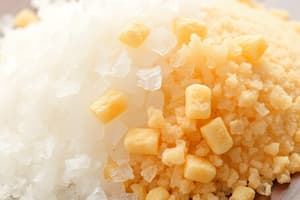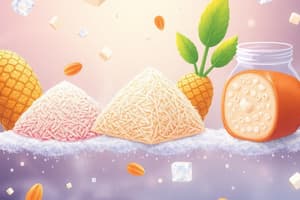Podcast
Questions and Answers
What is sucrose?
What is sucrose?
- A polysaccharide
- An organic compound with a -OH group
- A monosaccharide
- A disaccharide containing one glucose and one fructose molecule (correct)
What is photosynthesis?
What is photosynthesis?
A process through which plants convert energy from the sun into glucose.
What is caramelization?
What is caramelization?
Subjecting sugar to high or prolonged heat changes the sugar into a brown liquid.
What is a saccharide?
What is a saccharide?
What is the basic structure of carbohydrates?
What is the basic structure of carbohydrates?
What are monosaccharides?
What are monosaccharides?
What is a hydroxyl group?
What is a hydroxyl group?
What is a disaccharide?
What is a disaccharide?
What is insulin?
What is insulin?
What is an interfering agent?
What is an interfering agent?
What is alcohol in chemistry?
What is alcohol in chemistry?
What is hydrolysis?
What is hydrolysis?
What is lactose?
What is lactose?
What is fructose?
What is fructose?
What is invert sugar?
What is invert sugar?
What is diabetes mellitus?
What is diabetes mellitus?
What is glycogen?
What is glycogen?
What is glucose?
What is glucose?
What is a candy thermometer?
What is a candy thermometer?
What is a heavy saucepan used for?
What is a heavy saucepan used for?
What is a microwave used for in cooking?
What is a microwave used for in cooking?
What are sugars?
What are sugars?
What are starches and fibers?
What are starches and fibers?
What are carbohydrates composed of?
What are carbohydrates composed of?
What does photosynthesis require?
What does photosynthesis require?
What is chlorophyll?
What is chlorophyll?
What do plants convert during photosynthesis?
What do plants convert during photosynthesis?
What is galactose?
What is galactose?
What is sucrose commonly known as?
What is sucrose commonly known as?
Where is lactose found?
Where is lactose found?
What is maltose?
What is maltose?
What happens when food contains single sugars?
What happens when food contains single sugars?
Flashcards are hidden until you start studying
Study Notes
Key Carbohydrate Terms
- Sucrose: A disaccharide comprising one glucose and one fructose molecule. Commonly known as table sugar.
- Monosaccharides: Simple sugar molecules that cannot be further broken down without altering their basic structure. Examples include glucose and fructose.
- Disaccharide: Formed by two monosaccharides joined together, such as sucrose (glucose + fructose) and lactose (glucose + galactose).
- Lactose: A disaccharide sugar found in milk, made of one glucose and one galactose molecule.
- Maltose: A disaccharide known as malt sugar, derived from grains, and is the least sweet of the common sugars.
Processes and Reactions
- Photosynthesis: A process by which plants convert sunlight energy into glucose, requiring carbon dioxide, water, chlorophyll, and sunlight. It transforms radiant energy into chemical energy.
- Caramelization: The process of heating sugar, leading to the formation of a brown liquid through high or prolonged heat exposure.
- Hydrolysis: A reaction where disaccharides and larger molecules are divided into smaller units by adding water, resulting in the production of monosaccharides.
Biological Functions and Compounds
- Insulin: A hormone produced by the pancreas that facilitates the transport of glucose into the cells for use as energy.
- Glycogen: The form in which the body stores carbohydrates, consisting of multi-branched chains of glucose.
- Diabetes Mellitus: A condition characterized by the body's inability to transfer glucose from the bloodstream into the cells.
Chemical Structure and Composition
- Carbohydrates: Composed of carbon (C), hydrogen (H), and oxygen (O), following the general structure Cx(H₂O)y. They can be categorized into simple carbohydrates (sugars) and complex carbohydrates (starches and fibers).
- Hydroxyl Group: A functional group (-OH) that consists of an oxygen atom bonded to a hydrogen atom, often found in alcohols and sugars.
- Invert Sugar: A mixture of glucose and fructose created by hydrolyzing sucrose.
Cooking and Preparation Tools
- Candy Thermometer: A tool used to measure the precise temperature needed for candy making.
- Heavy Saucepan: A kitchen tool designed to distribute heat evenly and prevent scorching during cooking.
- Microwave: Effective for creating various types of candy due to its ability to heat ingredients evenly.
Additional Sugar Types and Sources
- Fructose: A naturally occurring monosaccharide found abundantly in fruits and honey; sweeter than glucose.
- Galactose: A sugar found in milk and dairy products, primarily present in the form of lactose.
- Sugars: Encompasses all simple carbohydrates which are quickly absorbed into the bloodstream.
Absorption and Impact
- Single Sugars: Foods containing monosaccharides are absorbed rapidly into the bloodstream, leading to quick energy availability.
Practical Examples
- Table Sugar: A common name for sucrose, used widely as a sweetener.
- Dairy Products: Contain lactose, the sugar that contributes to their sweetness.
- Grain Products: Source of maltose, which has a less sweet profile compared to other sugars.
Studying That Suits You
Use AI to generate personalized quizzes and flashcards to suit your learning preferences.




